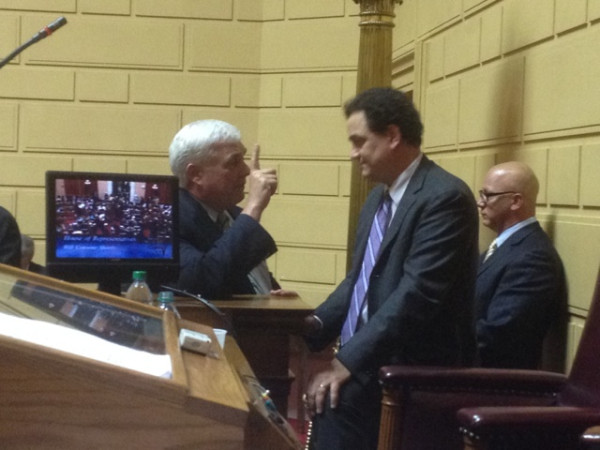
Over and over, I have had many frustrating conversations with people who don’t understand how egalitarian policies and land-use/transportation fit together, to the point that I’ve been working on a piece to parse apart the details. Just as I was on my fourth or fifth draft, a perfect example of people having all the right impulses in all the wrong places fell right into my lap like a ripe apple.
Exhibit A: Seattle advocates want to fix poverty by complaining about development and subsidizing parking. Face palm! According to The Next City, a Philadelphia-based urbanist blog, the proposal would:
1) Honor all requests for low-income restricted parking zone; 2) Charge no more than five dollars per year for low-income restricted parking permits; and 3) Allow restricted parking zone permits for registered nonprofits located within a restricted parking zone.
The Next City goes on to say:
On its face, Sen. Jayapal’s revision reads like a NIMBYish cry to protect her constituents’ parking as transit expands and density increases.
Ding ding ding! We have a winner! But then The Next City says:
In reality, it is part of a broader effort to protect some of Seattle’s most diverse and lowest-income communities from the high risks of displacement that rode into the neighborhood on light rail.
Um, no.
A tri-cornered hat
There are three basic progressive policy choices on any given issue, but the three do not always overlap. It’s important to understand the differences between them, because shooting from the hip without clarity sends you all over the map.
- Leave people alone. This is like the null hypothesis. There are lots of times when we should do something, but having a policy choice that says “do nothing” reminds us to think clearly about what we’re trying to accomplish, and whether we’re overstepping our bounds and creating a new problem out of whole cloth.
- Set a policy that equalizes people’s position. This is a huge one. There’s no end to the moral and practical reasons we should want to eliminate the unnatural wealth gap that exists in this country.
- Set a policy that incentivizes people’s behavior. Of course, fighting inequality relies on incentives, but the best poverty fighting does that and leaves everything else alone. So this category sums up policies that incentivize other things; examples include pay-as-you-throw trash collection, tolls and congestion pricing, and fines for not shoveling one’s sidewalk.
These three policy goals are not the same! Don’t tell me that pay-as-you-throw trash collection means that creating more trash costs more, and is therefore regressive. That would be the case if we fail to have option #2 in our policy array, because then very unequal people would be paying market prices without any counterbalance to ensure they stay within reach of one another. And for sure, our country doesn’t do very well with #2. But Fixing the lack of equality with #1 or #3 doesn’t work. It just creates a mess.
Let’s break it down
 Leave it alone: Gentrification, which I will define here as the displacement of poor people from a neighborhood when wealthier people move in, mostly doesn’t exist. So at the outset, I bristle at the article because it misdiagnoses a positive thing as a problem.
Leave it alone: Gentrification, which I will define here as the displacement of poor people from a neighborhood when wealthier people move in, mostly doesn’t exist. So at the outset, I bristle at the article because it misdiagnoses a positive thing as a problem.
A very wide-ranging study of 1,100 U.S. Census tracts from 1970 to the present shows that most high poverty census tracts stayed that way, that we actually gained some high poverty Census tracts, and that those Census tracts that did get new investment mostly maintained the same number of low income people, while simply gaining higher income people alongside them (that mix, the study found, actually ameliorated poverty, while in the most isolated Census tracts, poor people’s lives got worse). Although not concerned by gentrification per se, the study concluded that poverty remains a serious, wrenching problem that should actively confronted by government. Daniel Kay Hertz does a really great breakdown of the information in the context of Chicago, and This Old City has some great, specific data on housing prices in Philadelphia (the data pre-date the study). The point is, the model we have that says we have to jump in to stop gentrification is mostly wrong.
If your neighborhood is popular, that’s a good thing. But you should make sure there’s enough housing to allow everyone to enjoy that. And in a lot of cases that means leaving things alone.
Equalize people: The same study on gentrification that concluded that housing development should be allowed to happen, even encouraged, in gentrifying areas also concluded that deep, centralized, isolating poverty remains a problem in the U.S. It won’t be news to anyone here that poverty is, in fact, growing. So while under #1. we talked about how to leave something alone that’s not a problem, under #2 we should focus on how to change something that is a dire problem.
Some of the best programs that equalize people included the 1950s consensus to have an income tax system that decreased the income and wealth gap in the U.S. by creating an effective maximum wage, a proposed program for a guaranteed minimum income or its cousin the Earned Income Tax Credit. Other examples include the Estate Tax, which at the federal and state level has always been a way to equalize the inherited wealth gap. What’s perfect about these programs is they very squarely take on the problem of the rich getting richer and the poor getting poorer, but they stay hands off about exactly what it is that people do with the money beyond that. But that brings us to #3. . .
Incentivize behavior: In general, it’s good to let people have choices, but sometimes there is a society-wide reason for pushing people to make a particular decision. You would hope that one of the behaviors that cities would want to encourage would be driving less, and in fact, Seattle is a city that has made huge strides in that direction, moving from above 50% of urban core trips by single-occupant drivers to just around 30% in just a short time. But a program of subsidizing parking, though intended to accomplish the goals under #2, is actually a really bad conflation with #3. It incentivizes behavior: the wrong behavior.
These three categories fit together. You want to leave alone development–i.e., gentrification–and in fact, where housing prices have risen to the point of pushing low income residents out, it has been because zoning or other policies have gotten in the way of housing growth. You do want to take from the rich and give to the poor, but not in a way that interferes with that. And you absolutely want to push people away from cars, so your incentives shouldn’t nudge people towards them.
We get these three all mixed up. We don’t leave housing development alone. We put all sorts of constraints on it, from not allowing federally-backed lending for apartments, to zoning against density and for parking, to spending more than half of our road money on road expansion in order to encourage sprawl. We certainly don’t effectively deal with poverty. The top income tax rate used to be 90%, and the point of that was to create a disincentive against ridiculous executive salaries, simply and elegantly, and instead incentivize reinvestment into middle income jobs and capital improvements. And everything, everything we can think of goes into making driving easier. Alongside the pittance of money for walking, biking, and transit, we throw huge subsidies towards parking fees, new garages, wider roads, cheaper oil–and all of it, we say, is because we want to keep the American Dream alive.
The results are summed up pretty well by Angie Schmitt:
The suburbs: In exchange for your "free" — not really free — parking you are chained to two cars that cost you 18% of your income. #win!
— Angie Schmitt🚶♀️ (@schmangee) February 25, 2015
And, of course, any policy that mixes things up this way has the potential to help some poor people along with many middle class people, and leave some poor people completely out in the cold.
It’s so frustrating when you’re explaining to someone how to fix transportation or land use policy and that person responds by placing those goals at odds with equity. There couldn’t be anything further from the truth. If we could straighten out the differences between different policy options, we could have clearer conversations about the huge range of problems that face us.
~~~~







 At the State House hearing for the
At the State House hearing for the 
